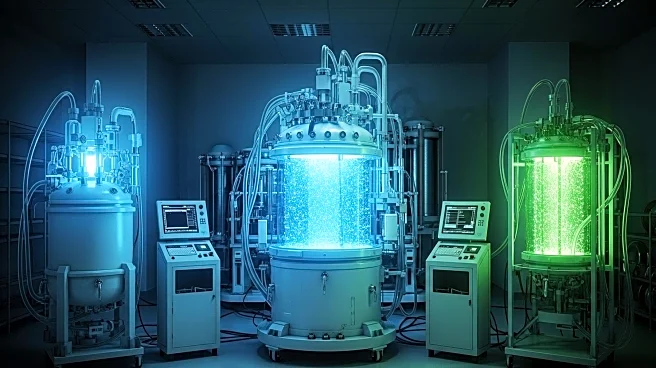What's Happening?
The biomanufacturing sector is experiencing a global capacity squeeze due to increasing demand for complex biologics such as monoclonal antibodies, bispecific and multispecific antibodies, and antibody-drug conjugates. These advanced biologics require specialized manufacturing capabilities, which are becoming central to therapeutic strategies. However, the infrastructure to support these modalities is limited, leading to constraints in clinical and commercial pipelines. Contract development and manufacturing organizations (CDMOs) are operating at near full capacity, prioritizing high-volume commercial contracts, which limits availability for clinical or early-stage development programs. The mismatch between supply and demand is exacerbated by the need for bespoke facilities capable of handling complex biologics, posing challenges for developers in securing timely manufacturing slots.
Why It's Important?
The capacity squeeze in biomanufacturing has significant implications for the biopharmaceutical industry. Small- and mid-sized biotechnology companies are particularly affected, facing delays in early-phase programs due to the inability to secure timely GMP manufacturing. This can lead to missed clinical trial timelines and delayed filings for investigational new drug applications, posing existential threats to venture-backed companies. Larger pharmaceutical companies also face increased competition for production slots and longer lead times. CDMOs must balance short-term commercial priorities with long-term capacity planning, as facility expansion timelines are not agile enough to meet demand forecasts. The uncertainty around future manufacturing availability impacts pipeline planning and resource allocation for biopharmaceutical companies.
What's Next?
To address the capacity squeeze, leading CDMOs are adopting a proactive partnership-driven model, focusing on early alignment of pipeline forecasts, facility needs, and technical requirements. Strategic partnerships aim to derisk capacity planning, allowing CDMOs to optimize slot allocations and infrastructure investment strategies. Embracing standardized facility and process designs, automation, and digitalization are crucial for CDMOs to enable rapid technology transfer and maintain compliance. Flexible facility design is essential to address the capacity squeeze, allowing for modular, scalable, and cross-compatible configurations. The sector must transition from reactive slot allocation to proactive strategic partnerships to support the next wave of complex biologics.
Beyond the Headlines
The shift towards complex biologics is accompanied by more stringent quality requirements, with regulatory expectations for data compliance, traceability, and reproducibility continuing to rise. CDMOs must invest in cross-functional manufacturing science and technology teams to ensure continuity and reduce variation. Quality-by-design principles should be integrated into process design, supported by robust risk assessments and traceable process data. Facility flexibility supports faster onboarding of new technologies and modalities, crucial for staying relevant in client requests for proposals. The biomanufacturing sector must invest ahead of demand while staying lean and interoperable to support the next wave of complex biologics.









